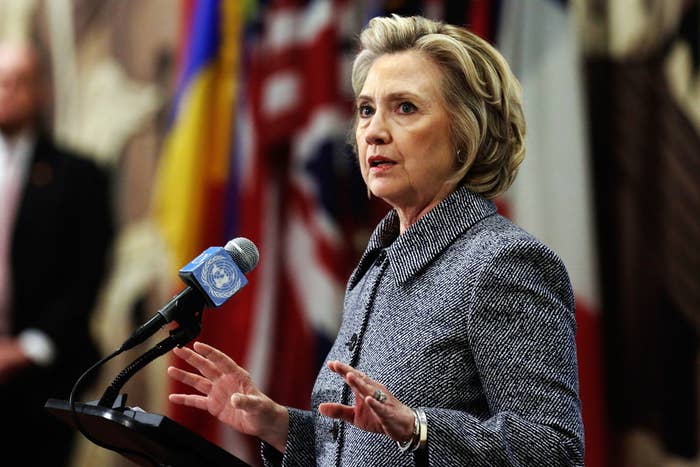
The United Nations Security Council Stakeout has played host to world-historic events. It's where Iranian negotiators meet the press, where heads of state talk war and peace. Picasso's "Guernica," looming to the left of the podium, is meant to push them toward peace.
The U.N. is also, always, kind of a shitshow. It's inaccessible, incomprehensible, disempowered, roiling with frustration. And so it was probably the right place for the effective kickoff of the 2016 general election campaign Tuesday.
Clinton events — the 2008 campaign, the 1976 race for attorney general of Arkansas, certainly the 1992 campaign, large stretches of the presidency — often have the feeling that the wheels are about to fall off, and Tuesday's press conference was a masterpiece in that genre. The scene was a mess. The 15 flags of the member nations to the Security Council were shoved in front of the mural, while Hillary Clinton spoke in front of the council's bilingual U.N. backdrop, which appeared to be attached to the wall. Across some 10 feet of brown carpet, some 200 reporters and more than 25 cameras gathered — the biggest crowd assembled here since, one veteran correspondent wagered, the run-up to the Iraq War in 2003.
Reporters turned up starting before 9:00 a.m. at the entrance on 45th Street and First Avenue, where a single U.N. staffer named Mark, working on an aging computer, brushed his hair from his eyes and did his best to accommodate the unreasonable and unanticipated ("Why are you all here?" the receptionist asked) flood of journalists seeking accreditation. High-tone television correspondents sent producers to wait and strode up past the grumbling press; other old TV faces, like David Shuster — now at Al Jazeera — had to wait for themselves. On email, a Clinton aide did his best, reassuring reporters that they were trying to help people get in. A 11:27 a.m. email urged people to reply by 11:45 to be sure they'd have a spot. We did, and we got in.
And indeed Clinton events — the campaigns, the presidency, the secretariat — have a way of coming off all right in the end. On the technical merits, Clinton's press conference went without major disaster. She began with the reason she was at the U.N. — the cause of women's rights — and then made some real news, going hard at Republicans who wrote a letter to Tehran trying to disrupt the White House's nuclear talks with Iran. She nailed the jab of a transition — "I would be pleased to talk more about this important matter, but I know there have been questions about my emails" — gave the ceremonial first question to the Turkish dean of the U.N. press corps — and then, given the substance, it could have gone worse.
The substance is bad: Clinton selected the emails she deemed public, and then made an active choice to delete the others, or to instruct her lawyers to delete them. Presumably there was a meeting; she made a choice. She said that was because the emails were about flower arrangements and yoga; but why delete that? This is a hard question that she avoided on the first take, saying she "chose not to keep them" — as though emails evaporate if not retained. Then, asked directly, she avoided it again: She deleted them "because they were personal and private," she said. "I didn't see any reason to keep them."
The real answer is guessable: The Clintons have lived, for 25 years, surrounded by lawyers who tell them that anything put on paper can be subpoenaed by their enemies. Their enemies, indeed, would certainly have sought some sort of review of these emails, if they've been deleted. (Is anything really deleted, by the way? Craig Silverman suggested that we end this rigamarole by asking the NSA for copies.)
But would giving Republicans emails she says were about yoga be all that bad? The space opened by the deleted emails will now be filled by the imaginings of her worst enemies, if not the emails themselves, should they surface from the people she was emailing with.
Still, Clinton, delivering a bad message and taking her political medicine, delivered it serviceably. She was confident. She took eight or nine questions. She didn't make it any worse than it, in fact, is.
And we got a feel for what kind of a campaign this will be: one that barrels forward with the wheels nearly off at all times. That is, a Clinton campaign. Full of mistakes and tactics and drama and risk — the sort of thing that reporters love to cover, and that Bill Clinton always seemed to feed off. Hillary Clinton, though, draws no energy from the chaos, and the difference between Bill Clinton in a corner and Hillary Clinton in a corner seems to be that she is really having no fun at all, except, perhaps, in the late days of her 2008 run. She is a stoic, and she soldiered through Tuesday, looking at the press pack with undisguised dislike and occasionally seeming to look right through us and onto a couple more — 10 more? — awful years of this, every day.
If there was a difference from the old ones, it is that this won't be a Clinton campaign where the Clinton in question seems to be having a perverse kind of fun feeding on the chaos. Tuesday, Hillary Clinton projected the stoicism of a person who really, truly hates what she's doing, and does it anyway.
